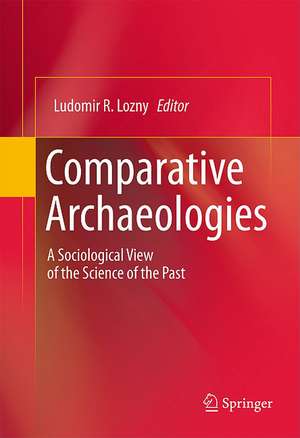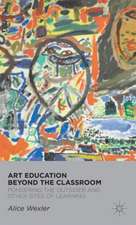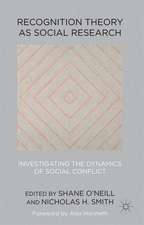Comparative Archaeologies: A Sociological View of the Science of the Past
Editat de Ludomir R Loznyen Limba Engleză Hardback – 11 apr 2011
This comprehensive book explores regional archaeologies from a sociological perspective—to identify and explain regional differences in archaeological practice, as well as their existing similarities. This work covers not only the currently-dominant Anglo-American archaeological paradigm, but also Latin America, Western and Eastern Europe, Asia, and Africa, all of which have developed their own unique archaeological traditions. The contributions in this work cover these "alternative archaeologies," in the context of their own geographical, political, and socio-economic settings, as well as the context of the currently accepted mainstream approaches.
| Toate formatele și edițiile | Preț | Express |
|---|---|---|
| Paperback (1) | 1243.78 lei 6-8 săpt. | |
| Springer – 22 aug 2016 | 1243.78 lei 6-8 săpt. | |
| Hardback (1) | 1249.63 lei 6-8 săpt. | |
| Springer – 11 apr 2011 | 1249.63 lei 6-8 săpt. |
Preț: 1249.63 lei
Preț vechi: 1523.93 lei
-18% Nou
Puncte Express: 1874
Preț estimativ în valută:
239.11€ • 249.65$ • 197.90£
239.11€ • 249.65$ • 197.90£
Carte tipărită la comandă
Livrare economică 04-18 aprilie
Preluare comenzi: 021 569.72.76
Specificații
ISBN-13: 9781441982247
ISBN-10: 1441982248
Pagini: 852
Ilustrații: XV, 852 p.
Dimensiuni: 155 x 235 x 51 mm
Greutate: 1.36 kg
Ediția:2011
Editura: Springer
Colecția Springer
Locul publicării:New York, NY, United States
ISBN-10: 1441982248
Pagini: 852
Ilustrații: XV, 852 p.
Dimensiuni: 155 x 235 x 51 mm
Greutate: 1.36 kg
Ediția:2011
Editura: Springer
Colecția Springer
Locul publicării:New York, NY, United States
Public țintă
ResearchCuprins
Preface, Willem Willems
Introduction, Ludomir R. Lozny
Chapter 1. Ludomir R. Lozny, Archaeology in the age of globalization: local meanings, global culture.
Part I. Archaeology in Europe
Chapter 2. Ulrich Veit, Toward a Historical Sociology of German Archaeology.
Chapter 3. Kristian Kristiansen, A Social History of Danish Archaeology.
Chapter 4. J. Hegardt and Anna kallen, Being Through The Past: Reflections on Swedish archaeology and heritage management.
Chapter 5. Visa Immonen and Jussi-Pekka Taavitsainen, Oscillations between the national and the international: The case of Finnish archaeology.
Chapter 6. Arkadiusz Marciniak, Contemporary Polish archaeology in global context.
Chapter 7. Ludomir R. Lozny, Polish Archaeology in Retrospective.
Chapter 8. S. Tomaskova, Archaeology in a middle country.
Chapter 9. N. Kradin, A Panorama of Social Archaeology in Russia.
Chapter 10. László Bartosiewicz, Dóra Mérai, and Péter Csippán Dig up – Dig in: practice and theory in Hungarian archaeology.
Chapter 11. Predrag Novakovic, Archaeologies in Souteast Europe.
Chapter 12. David Small, Archaeology in the Near East (Israel).
Part II. Archaeology in South America and the Caribbean Region
Chapter 13. Gustavo G. Politis and Rafael Pedro Curtoni, Archaeology and Politics in Argentina: The Last Fifty Years.
Chapter 14. Irina Podgorny, “Silent and alone”. How the ruins of an ancient city found close to Palenque were taught to talk the language of archaeology (Mesoamerica).
Chapter 15. Mario Sanoja Obediente and Iraida Vargas-Arenas, The Past and the Revolutionary Interpretation of the Present: Our Experience of Social Archaeology, 33 Years Later.
Chapter 16. Izumi Shimada and Rafael Vega-Centeno, Peruvian Archaeology: Its Growth, Characteristics, Practice and Challenges.
Chapter 17. Augusto Oyuela-Caycedo and Alejandro Dever, The Agency of Academic Production in Colombian Archaeology.
Chapter 18. Antonio Curet, Archaeology in Cuba and the Caribbean Islands.
Part III. Archaeology in Asia and the Pacific Region
Chapter 19. Fumiko Ikawa-Smith, Archaeology in Contemporary Japan.
Chapter 20. Rasmi Shocoongdej, Contemporary Archaeology as a Global Dialogue: Reflections from Southeast Asia Archaeology in Southeastern Asia.
Chapter 21. Frank Thomas, Pacific Islands Archaeology.
Part IV. Archaeology in Africa
Chapter 22. Beatrice Sandelowsky, The Status of Archaeology and Anthropology in Southern Africa Today: Namibia as Example.
Chapter 23. Yusuf Juwayeyi, Excavating the History of Archaeology in Malawi.
Chapter 24. C.A. Folorunso, The Practice of Archaeology in Nigeria.
Afterword Ludomir R. Lozny
Index
.
Introduction, Ludomir R. Lozny
Chapter 1. Ludomir R. Lozny, Archaeology in the age of globalization: local meanings, global culture.
Part I. Archaeology in Europe
Chapter 2. Ulrich Veit, Toward a Historical Sociology of German Archaeology.
Chapter 3. Kristian Kristiansen, A Social History of Danish Archaeology.
Chapter 4. J. Hegardt and Anna kallen, Being Through The Past: Reflections on Swedish archaeology and heritage management.
Chapter 5. Visa Immonen and Jussi-Pekka Taavitsainen, Oscillations between the national and the international: The case of Finnish archaeology.
Chapter 6. Arkadiusz Marciniak, Contemporary Polish archaeology in global context.
Chapter 7. Ludomir R. Lozny, Polish Archaeology in Retrospective.
Chapter 8. S. Tomaskova, Archaeology in a middle country.
Chapter 9. N. Kradin, A Panorama of Social Archaeology in Russia.
Chapter 10. László Bartosiewicz, Dóra Mérai, and Péter Csippán Dig up – Dig in: practice and theory in Hungarian archaeology.
Chapter 11. Predrag Novakovic, Archaeologies in Souteast Europe.
Chapter 12. David Small, Archaeology in the Near East (Israel).
Part II. Archaeology in South America and the Caribbean Region
Chapter 13. Gustavo G. Politis and Rafael Pedro Curtoni, Archaeology and Politics in Argentina: The Last Fifty Years.
Chapter 14. Irina Podgorny, “Silent and alone”. How the ruins of an ancient city found close to Palenque were taught to talk the language of archaeology (Mesoamerica).
Chapter 15. Mario Sanoja Obediente and Iraida Vargas-Arenas, The Past and the Revolutionary Interpretation of the Present: Our Experience of Social Archaeology, 33 Years Later.
Chapter 16. Izumi Shimada and Rafael Vega-Centeno, Peruvian Archaeology: Its Growth, Characteristics, Practice and Challenges.
Chapter 17. Augusto Oyuela-Caycedo and Alejandro Dever, The Agency of Academic Production in Colombian Archaeology.
Chapter 18. Antonio Curet, Archaeology in Cuba and the Caribbean Islands.
Part III. Archaeology in Asia and the Pacific Region
Chapter 19. Fumiko Ikawa-Smith, Archaeology in Contemporary Japan.
Chapter 20. Rasmi Shocoongdej, Contemporary Archaeology as a Global Dialogue: Reflections from Southeast Asia Archaeology in Southeastern Asia.
Chapter 21. Frank Thomas, Pacific Islands Archaeology.
Part IV. Archaeology in Africa
Chapter 22. Beatrice Sandelowsky, The Status of Archaeology and Anthropology in Southern Africa Today: Namibia as Example.
Chapter 23. Yusuf Juwayeyi, Excavating the History of Archaeology in Malawi.
Chapter 24. C.A. Folorunso, The Practice of Archaeology in Nigeria.
Afterword Ludomir R. Lozny
Index
.
Notă biografică
Ludomir Lozny is current managing editor of the journal Human Ecology, and an adjunct professor at Hunter College in the Department of Archaeology.
Textul de pe ultima copertă
Archaeology, as with all of the social sciences, has always been characterized by competing theoretical propositions based on diverse bodies of locally acquired data. In order to fulfill local, regional expectations, different goals have been assigned to the practitioners of Archaeology in different regions. These goals might be entrenched in local politics, or social expectations behind cultural heritage research.
This comprehensive book explores regional archaeologies from a sociological perspective—to identify and explain regional differences in archaeological practice, as well as their existing similarities. This work covers not only the currently-dominant Anglo-American archaeological paradigm, but also Latin America, Western and Eastern Europe, Asia, and Africa, all of which have developed their own unique archaeological traditions. The contributions in this work cover these "alternative archaeologies," in the context of their own geographical, political, and socio-economic settings, as well as the context of the currently accepted mainstream approaches.
This comprehensive book explores regional archaeologies from a sociological perspective—to identify and explain regional differences in archaeological practice, as well as their existing similarities. This work covers not only the currently-dominant Anglo-American archaeological paradigm, but also Latin America, Western and Eastern Europe, Asia, and Africa, all of which have developed their own unique archaeological traditions. The contributions in this work cover these "alternative archaeologies," in the context of their own geographical, political, and socio-economic settings, as well as the context of the currently accepted mainstream approaches.
Caracteristici
Applies sociological methods to the study of Archaeology
Case studies of 22 countries
Creates a common framework for comparing archaeological approaches across country and cultural lines
Vital source for archaeologists to understand how archaeology is performed all over the world
Includes supplementary material: sn.pub/extras
Case studies of 22 countries
Creates a common framework for comparing archaeological approaches across country and cultural lines
Vital source for archaeologists to understand how archaeology is performed all over the world
Includes supplementary material: sn.pub/extras















